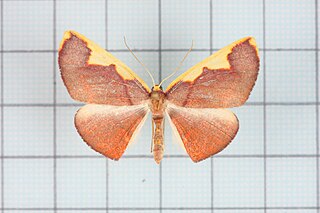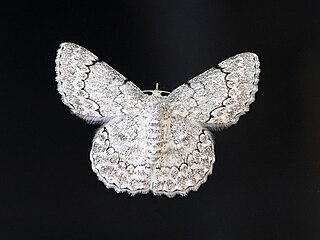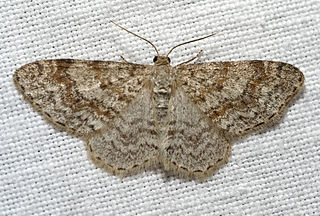
Biston is a genus of large, long-winged moths belonging to the family Geometridae. It is most notable for containing the well-known peppered moth. The genus was first described by William Elford Leach in 1815.

Spilomelinae is a very species-rich subfamily of the lepidopteran family Crambidae, the crambid snout moths. With 4,132 described species in 340 genera worldwide, it is the most speciose group among pyraloids.

Abraxas, the magpie moths, is a genus of moths in the family Geometridae. It was first described by William Elford Leach in 1815.

Aporandria is a monotypic moth genus in the family Geometridae described by Warren in 1894. Its single species, Aporandria specularia, was first described by Achille Guenée in 1857. It is found in Sri Lanka, India, Vietnam, Thailand, the Andamans, Peninsular Malaysia, Sumatra, Borneo, the Philippines and Sulawesi.

Cleorodes is a monotypic moth genus in the family Geometridae described by Warren in 1894. Its single species, Cleorodes lichenaria, the Brussels lace, was first described by Johann Siegfried Hufnagel in 1767.

Eugonobapta is a monotypic moth genus in the family Geometridae described by Warren in 1894. Its only species, Eugonobapta nivosaria, the snowy geometer, was first described by Achille Guenée in 1857. It is found in North America from Manitoba to New Brunswick, south to North Carolina and Tennessee.

Herochroma is a genus of moths in the family Geometridae. The genus was described by Charles Swinhoe in 1893.

Iridopsis is a genus of moths in the family Geometridae first described by Warren in 1894.

Maxates is a genus of moths in the family Geometridae first described by Frederic Moore in 1887.

Nothomiza is a genus of moth in the family Geometridae described by Warren in 1894.

Phyllodonta is a genus of moths in the family Geometridae described by Warren in 1894.

Pingasa is a genus of moths in the family Geometridae first described by Frederic Moore in 1887.
Yashmakia is a genus of moths in the family Geometridae described by Warren in 1901.

Sterrhinae is a large subfamily of geometer moths with some 3,000 described species, with more than half belonging to the taxonomically difficult, very diverse genera, Idaea and Scopula. This subfamily was described by Edward Meyrick in 1892. They are the most diverse in the tropics with the number of species decreasing with increasing latitude and elevation.

Pingasa chlora, the white looper moth or flower-eating caterpillar, is a species of moth of the family Geometridae first described by Caspar Stoll in 1782. It is found Sundaland, the Philippines, Sulawesi and from the Moluccas to Queensland, Australia.

Asthenini is a tribe of geometer moths under subfamily Larentiinae first described by Warren in 1893. The tribe has been combined with Eupitheciini in the past, most notably by Jeremy Daniel Holloway in his work The Moths of Borneo.

Trichopterygini is a tribe of geometer moths under subfamily Larentiinae. The tribe was described by Warren in 1894.

Eupitheciini is a tribe of geometer moths under subfamily Larentiinae, often referred to as pugs. The tribe was described by Tutt in 1896.
Desmobathrinae is a subfamily of the moth family Geometridae described by Edward Meyrick in 1886.
The Pseudoterpnini are a tribe of geometer moths in the subfamily Geometrinae. The tribe was described by Warren in 1893. It was alternatively treated as subtribe Pseudoterpniti by Jeremy Daniel Holloway in 1996.
















